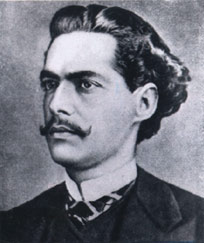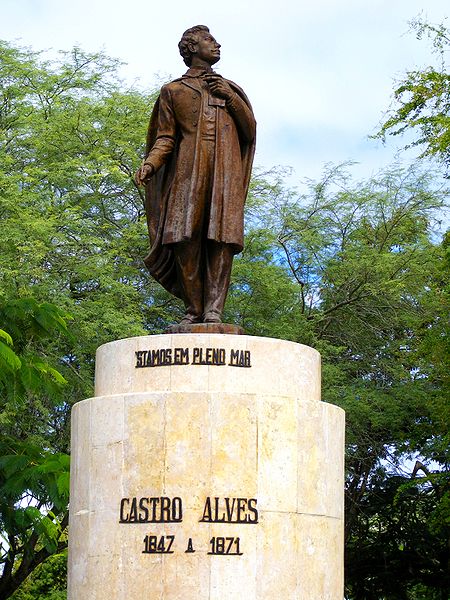<Back to Index>
- Immunologist Paul Ehrlich, 1854
- Poet Antonio Frederico de Castro Alves, 1847
- Leader of the Kurdistan Democratic Party Mustafa Barzani, 1903
PAGE SPONSOR


Antônio Frederico de Castro Alves (March 14, 1847 — July 6, 1871) was a Brazilian poet and playwright, famous for his Abolitionist and Republican poems. One of the most famous poets of the "Condorism", he won the epithet of "O Poeta dos Escravos" ("Slaves' Poet").
He is the patron of the 7th chair of the Brazilian Academy of Letters. Alves was born in the town of Curralinho (renamed "Castro Alves" in his honor in 1900), in the Brazilian State of Bahia, to Antônio José Alves, a physician, and Clélia Brasília da Silva Castro, daughter of José Antônio da Silva Castro (a.k.a. "Periquitão"), a proeminent fighter in the 1821 - 1823 Siege of Salvador. In 1853, he was sent to study in the Colégio Sebrão, run by Abílio César Borges, the Baron of Macaúbas. There, he would meet and befriend Ruy Barbosa. In 1862 he moved to Recife in order to study at the Faculdade de Direito do Recife, but he was rejected twice. He only was able to enter the college in 1864, where he met Tobias Barreto and José Bonifácio the Young,
who would be heavily influenced by him. His father would die in 1866,
and shortly after, he would start dating the Portuguese actress Eugênia Câmara. In 1867, Alves returned to Bahia alongside Câmara, and there he wrote his drama Gonzaga, ou A Revolução de Minas. In the following year, he and Câmara went to São Paulo, where Alves entered the Faculdade de Direito da Universidade de São Paulo and once more met with Ruy Barbosa. His play Gonzaga was performed at the end of 1868, being well received by the critics,
but Alves was saddened by his breakup with Eugênia Câmara. During a hunting excursion in the same year, Alves received an accidental shot in his left foot, that had to be amputated due to the threat of gangrene. He would spend the year of 1870 in Bahia, trying to recover from the tuberculosis he contracted while in São Paulo. Also in 1870, Alves published the poetry book Espumas Flutuantes — the only work he would publish during his lifetime. All his other works were published posthumously. Alves' attempts to recover from the tuberculosis were in vain; he would die on July 6, 1871, in the city of Salvador, Bahia, at 24 years of age.